 Petzlover
Petzlover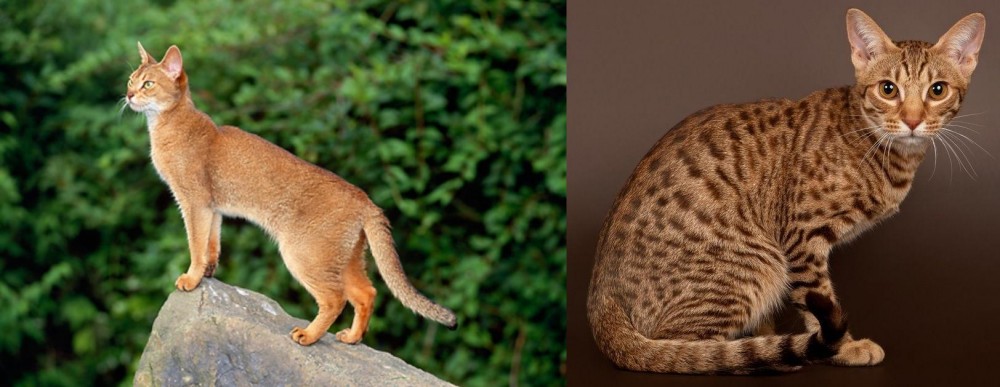 Abyssinian is originated from Ethiopia but Ocicat is originated from United States. Both Abyssinian and Ocicat are having almost same weight. Abyssinian may live 4 years less than Ocicat. Both Abyssinian and Ocicat has same litter size. Both Abyssinian and Ocicat requires Low Maintenance.
Abyssinian is originated from Ethiopia but Ocicat is originated from United States. Both Abyssinian and Ocicat are having almost same weight. Abyssinian may live 4 years less than Ocicat. Both Abyssinian and Ocicat has same litter size. Both Abyssinian and Ocicat requires Low Maintenance.
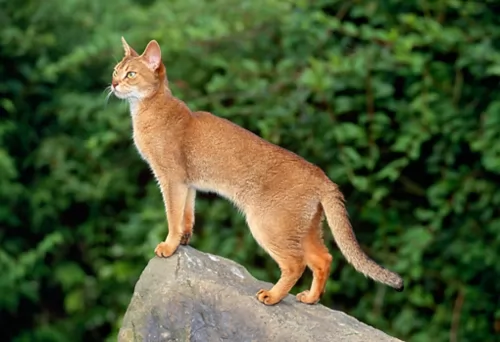 Known also as the Bunny Cat or the Abys, the Abyssinian cat hails from Abyssinia which is today known as Ethiopia.
Known also as the Bunny Cat or the Abys, the Abyssinian cat hails from Abyssinia which is today known as Ethiopia.
It is believed that the cat was brought to the UK in the 1860s. At first the cat was crossed with British Shorthairs, and later with oriental breeds.
The cat was imported in 1900 to America with some breeding programs starting in the United States in the 1930s. It is thought that it was a good thing that cats were exported to the U.S. because World War II took a toll on breed numbers but the breed was built up again in the USA.
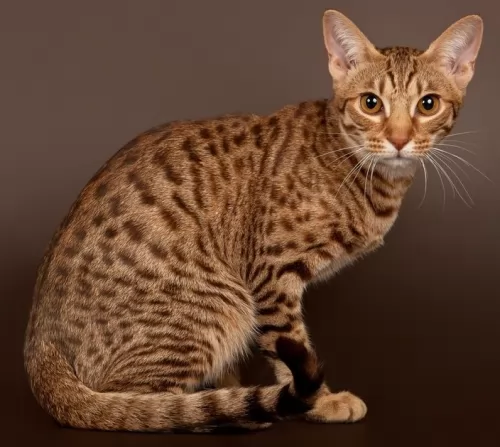 Virginia Daly was the first breeder of Ocicats, hailing from Michigan. She wanted to breed an Abyssinian-pointed Siamese in 1964 and the first kittens looked to be Abyssinian.
Virginia Daly was the first breeder of Ocicats, hailing from Michigan. She wanted to breed an Abyssinian-pointed Siamese in 1964 and the first kittens looked to be Abyssinian.
With the next litter, the Abyssinian-pointed Siamese and a spotted kitten, nicknamed an Ocicat. Further breedings produced more spotted kittens and became the basis of the Ocicat.
A breeding program was started for Siamese to Abyssinian, and the kittens bred to Siamese. Later the American Shorthair was introduced to the Ocicat and this brought in bigger boning as well as adding silver to the 6 colors of the Ocicat.
It was during the 1980s that the cat was accepted for registration in The Cat Fanciers' Association.
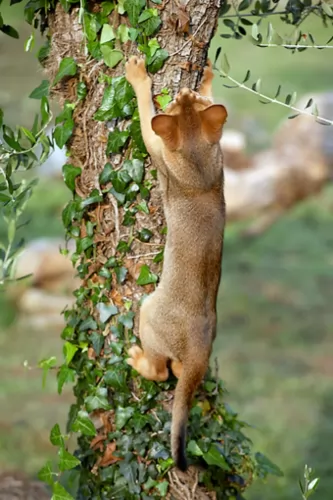 The Abyssinian is a slender, lithe, fine-boned, medium sized cat with shortish to medium length silky hair and long, slender legs.
The Abyssinian is a slender, lithe, fine-boned, medium sized cat with shortish to medium length silky hair and long, slender legs.
The fur has a distinctive ticked look. The coat comes in several colors – but its base color is a glossy reddish-brown base with black ticking.
You’ll find that the feline reaches a height of 20-25 cm and that its length is roughly 30-41 cm. When your Abyssinian is an adult it will weigh about 4-5 kg. With good care, your feline pet can reach up to 13 years of age.
The kittens are born with dark coats, but as they mature, the coat lightens. The head of the cat is somewhat wedge-shaped and it has fairly large ears with big almond-shaped eyes. The eyes can be green or hazel, depending on the coat shade. The tail is long and tapering.
The Abyssinian loves leaping onto cupboard tops or anything that has some height. It's an intelligent cat this Aby and always on the go. He is a playful cat and just loves being the center of attention, and when he has lots of toys he is always occupied, entertaining you with his antics.
If you were to be away at work every day, it would be a good idea to have a friend for him because he’s the kind of cat that becomes bored and lonely and then he becomes naughty. This cat is known as a clown with its outgoing, mischievous nature.
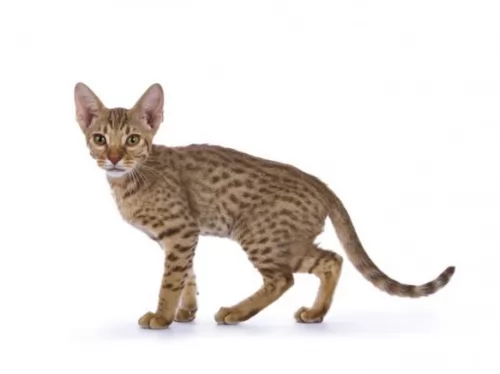 Ocicats, with their wedge-shaped heads, are strong, large cats with muscular legs that have striped markings. The cat can weight between 4 and 7kg. The ears are large and pointed.
Ocicats, with their wedge-shaped heads, are strong, large cats with muscular legs that have striped markings. The cat can weight between 4 and 7kg. The ears are large and pointed.
The cat has almond-shaped eyes. The fur has dark spots and there are many color variants that are approved by the major cat registries. The standard colors for the cat are chocolate, cinnamon and tawny.
These large cats have got personality traits from both cats – the Siamese and the Abyssinian. They are friendly, playful, and sociable cats, making excellent family pets, getting on well with children and other pets. Those who have owned them say owning such a cat is similar to owning a dog as they can be taught basic commands and tricks and even walk on a leash.
They are even known to swim with you. They’re cats that crave the attention of their human owners, but bond specifically with one person. It won’t do at all well in a household where it is left alone for long periods of time.
It's an intelligent cat and will most certainly need toys and a lifestyle that is stimulating.
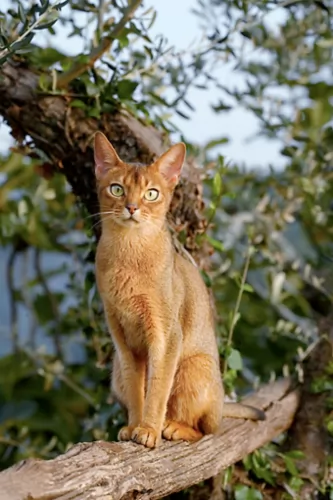 Your active Abyssinian cat is such a pleasure to have in the home as these cats love their human family as well as other pets in the home.
Your active Abyssinian cat is such a pleasure to have in the home as these cats love their human family as well as other pets in the home.
He’ll talk to you in a quiet way. They’re playful cats and you want to make sure you supply him with some stimulating toys.
Remember to brush his coat gently and make it a special therapeutic, bonding time. Make sure your active cat has exercise and provide some climbing equipment for him. Most of all he just wants to be around you and to get your loving attention.
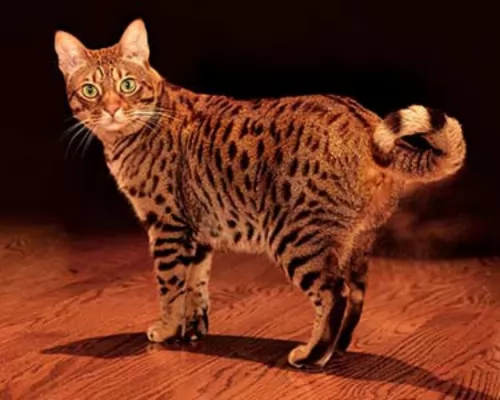 The Ocicat is a friendly, non-aggressive cat that is devoted to his human family. It’s a cat that thrives on being around people and won’t relish being left alone for long periods of time.
The Ocicat is a friendly, non-aggressive cat that is devoted to his human family. It’s a cat that thrives on being around people and won’t relish being left alone for long periods of time.
The largish cat is intelligent and easily trainable. He loves toys and it will be good to buy him some toys that require him thinking a little bit.
Highly energetic, he’ll love nothing more than for you to become involved in his games. Give him the attention he craves and he’ll become your best friend.
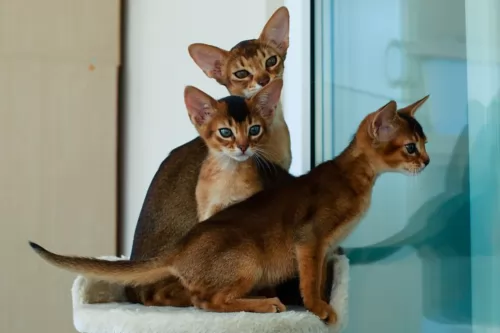 The Abyssinian has been known to be prone to kidney disorders. It can also be prone to gingivitis which can lead to periodontal disease.
The Abyssinian has been known to be prone to kidney disorders. It can also be prone to gingivitis which can lead to periodontal disease.
Also, the Abyssinian has been known to have problems with blindness. An eye problem, called progressive retinal atrophy is where the cells deteriorate over time and this is what causes the blindness.
The Abyssinian can also be prone to patellar luxation where the kneecap can become dislocated.
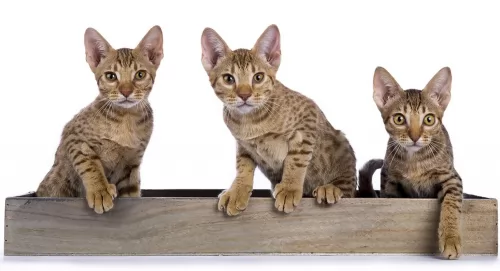 Diet is a crucial part of being a healthy cat, There are many excellent commercially manufactured cat foods on the market and your cat might prefer the wet- or dry type of cat food.
Diet is a crucial part of being a healthy cat, There are many excellent commercially manufactured cat foods on the market and your cat might prefer the wet- or dry type of cat food.
The idea is to choose the highest quality cat food that is packed with meat and protein as your cat is a carnivore. One good way to choose a good cat food is to read the ingredients and make sure that the first ingredients are meat.
He wants chicken, tuna, liver and pheasant in his diet. Make sure that the food also contains taurine as this is an essential amino acid that every cat must have.
If in any doubt, speak to your vet as cats require certain vitamins and minerals to remain healthy. Always ensure a fresh supply of cool drinking water.
Your cat requires being vaccinated and dewormed.
Get to know a good vet in your area so that if your cat is sick, you don't have to waste precious time searching for a vet.
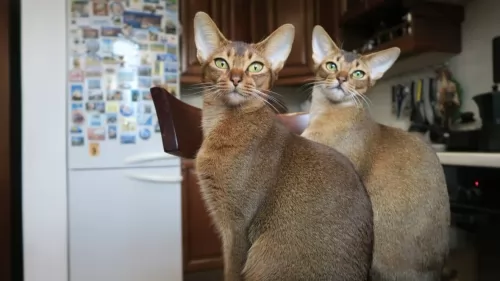 The Abyssinian cat’s short, fine coat is easy to care for. Brush and comb it timeously to remove loose hairs.
The Abyssinian cat’s short, fine coat is easy to care for. Brush and comb it timeously to remove loose hairs.
Because of periodontal disease, brush your cat's teeth. If you feel you don’t know how to perform any of these ‘caring’ routines for your kitty kat, don’t despair as your vet can do a dental cleaning procedure as well as your pet groomers.
Your Abyssinian cat is carnivorous and will need food similar to that which they would prey on in the wild. Your cat will require foods high in protein and with added vitamins and minerals.
Avoid cat foods that add in useless fillers such as wheat and soy. It is important that you buy the right cat food for your Abyssinian, and if you’re in any doubt, speak to your vet. Make sure your cat always has access to a bowl of fresh, cool water.
Always keep your Abyssinian’s litter box spotlessly clean. You can keep a special little plastic rake to rake up the sand and rid the box of cat droppings immediately.
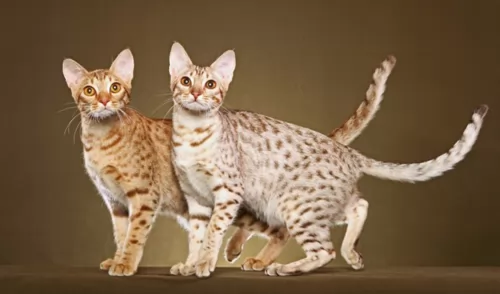 Provide your Ocicat with companionship as these are cats that can’t be left for hours on their own.
Provide your Ocicat with companionship as these are cats that can’t be left for hours on their own.
Provide your Ocicat with a litterbox that is kept clean. Your ocicat’s dropping must be regularly raked up out of the litter box sand and removed. A cat won’t use a dirty litterbox.
Treat your Ocicat for parasites. In fact, treating parasites isn’t a once-off treatment but ongoing. You can consult with your veterinarian for advice on the best and safest way to treat your pet for worms, ticks, fleas, and mites.
Brush your Ocicat’s fur once a week. They have short fur so they are fairly low maintenance. You can use a rubber hand brush and you can even wipe the fur down with a damp cloth to remove dust. He will have to have his claws trimmed.
Nobody should buy a pet and then do as little as possible for it. Your Ocicat’s going to need daily exercise as well as mental stimulation and he will require this through interaction with his human family. Buy him stimulating toys to keep him busy, play games with him and buy a cat leash so you can take him on walks outdoors for a bit of sunlight.